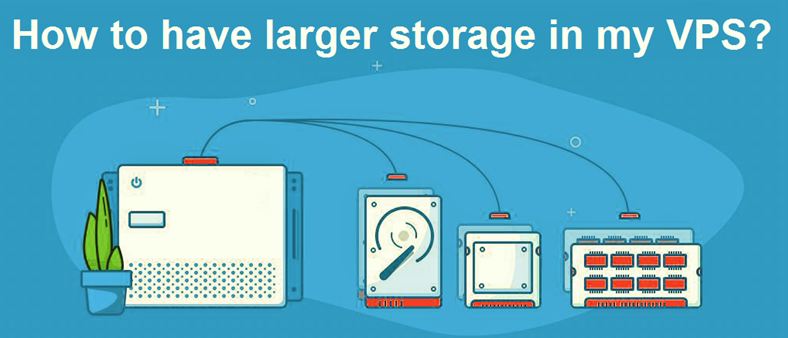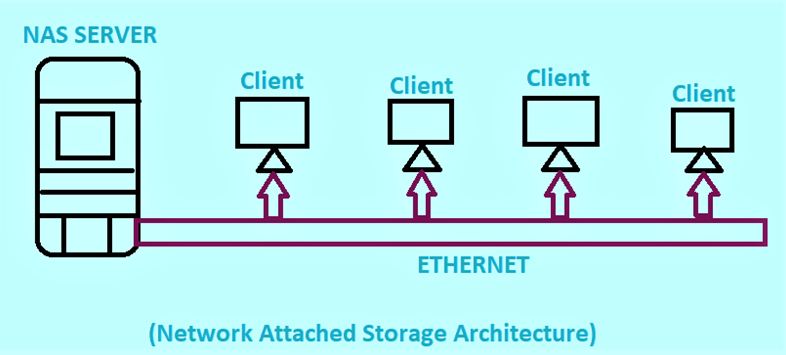Are your website storage needs increasing day by day? Does your Virtual Private Server (VPS) have insufficient storage as per your current requirements? Don’t worry, it is possible to have larger storage in your VPS to match it with your needs.
Increasing your VPS storage will allow you to easily store your website database, content, and business data. It can also help you store your backups and high-resolution multimedia content. Additionally, consider having some extra storage space for software updates for the proper functioning of your website.
Now that you know the need and importance of having larger VPS storage, let’s find out how to increase it.
How to have larger storage in my VPS?
There are several means to have additional storage capacity for your VPS. The methods vary based on the type of VPS setup you have and the options available with your hosting provider. Some common ways to expand your VPS storage are:
Resize Your VPS Instance
The easiest method to have larger storage for your VPS is resizing it. Resizing your VPS instance typically depends on the virtualization technology and the hosting provider you are using.
Most hosting providers support VPS resizing with a plan upgrade. Purchasing a bigger VPS instance often comes with more RAM, CPU, and storage for your website. So it is useful when your site is growing fast and demanding additional server resources.
It is best to secure more storage for your project well in advance. Upgrade your VPS instance directly or reach out to your hosting provider to discuss the available options and clear your doubts, when confused. A timely VPS upgrade will ensure the constant availability of your website without any lag or downtime.
Add Additional Drives
Some hosting providers allow you to add additional drives to increase the storage capacity of your VPS. The process of adding additional drives to your VPS may vary, depending on your hosting provider and the operating system you’re using.
In this method, the RAM, CPU, and other technical specifications of your server remain the same, unlike VPS instance resizing. The host will provide you only with additional storage based on your needs. It is a highly scalable solution for your growing storage needs. This flexibility is especially important for businesses and websites that experience variable storage requirements.
Getting additional drives for your VPS is useful when you don’t need more server resources overall. It allows you to stay with your existing VPS setup while expanding only your storage space. You can increase your VPS storage capacity without migrating to a larger VPS or making any major configuration changes.
Along with having larger VPS storage, adding additional drives can help you with data organization and segmentation. You can use separate drives for different types of data or applications. It will allow easier management and maintenance of your VPS storage. Also, you can enhance data security by isolating sensitive data from other parts of your VPS.
Use Cloud Storage Services
Another great way to have larger VPS storage is by utilizing Cloud storage services. Many third-party providers offer off-site storage solutions where they store digital data on cloud servers. These storage service providers are responsible for the management, hosting, and security of your data stored on their infrastructure.
You can use these cloud services like Google Cloud Storage, Amazon S3, or Dropbox to facilitate the growing storage needs of your website. Consider storing large files including high-resolution multimedia content to offload a good amount of data from your VPS. It is possible to mount this Cloud storage to your VPS and access it like a local drive.
Using cloud storage services is a more cost-effective solution than investing in additional drives or other physical hardware for increasing your VPS storage. It does not involve any upfront capital cost. Additionally, most cloud services follow a pay-as-you-go pricing model, so you will only be paying for the storage you will truly utilize.
Along with providing you with larger VPS storage, cloud storage services also help with data sharing and accessibility. You can access data stored on the Cloud anytime, anywhere. It allows you to easily share your data with team members, access your files from various devices, and collaborate on different projects.
Use Network Attached Storage (NAS)
Using Network Attached Storage (NAS) enables you to expand your VPS storage capacity. It is a storage system connected to a network for storing and retrieving data from a centralized location.
Thus, it simplifies data access and backup since all your files and data are stored in one location. Also, you can easily organize and manage your data with Network Attached Storage systems.
Setting up a NAS device or server and connecting it to your VPS will provide you with a flexible storage option. You can use additional space as and when required while keeping your data separate from your VPS. It is also suitable for data consolidation and easier data management across the entire infrastructure when you have multiple VPS instances or servers.
It is possible to access your data remotely with Network Attached Storage systems. Many NAS devices support remote access, thereby enabling you to access your data from anywhere with an internet connection. Along with providing you with larger server storage, NAS can be particularly useful for accessing and managing files and data while you’re away from your VPS.
Optimize Data Storage
Data storage optimization involves the use of techniques and strategies to enhance the data processing capabilities of your VPS. It allows you to refine the organization, allocation, and retrieval of data in your existing storage.
VPS hosting providers offer limited storage space with their plans. By optimizing your data storage, you can reduce your hosting costs, especially if you’re on a limited budget.
You must optimize the way you store data on your VPS from time to time. It will free up unnecessarily occupied storage space and, thus, help utilize your server resources more efficiently. It further leads to better server performance, which is crucial for running applications and websites smoothly.
Consider performing data deduplication, compressing your stored data, and deleting all unnecessary files. Additionally, move large or rarely-used data to external storage to optimize the data storage of your VPS. It enables you to scale your VPS more effectively as and when needed. Therefore, you will be easily able to add more resources as your needs grow without overcommitting to storage space you don’t need.
Proper organization and management of your data can also help you improve data security. You can set access controls and encryption more effectively when you have a clear understanding of your stored data.
Use Distributed File Systems
As the name suggests, A Distributed File System or DFS distributes your data on multiple file servers. It allows you to access your stored data through a computer network. This way, you will be able to access data stored at multiple locations just the way you would access your local storage.
Using a distributed file system like Ceph or GlusterFS will pool storage from multiple VPS instances by sharing the storage resources. Apart from increasing the storage capacity of your VPS, you will be getting a scalable solution in DFS.
Additionally, distributing your data and applications across multiple drives allows you to reduce the I/O (Input/Output) load on a single drive. It is specifically useful for applications that require fast disk access. Using DFS leads to improved application speed and server performance.
Some DFS solutions are capable of supporting geographical distribution. It allows you to replicate data across different regions or data centers. This, in turn, provides disaster recovery capabilities and low-latency access for VPS users in dispersed locations. So if you are looking for additional storage for data replication, this method might be more suitable for your needs.
Consider Managed VPS Services
Another excellent way to have larger storage in your VPS is by purchasing managed VPS services. Here your hosting provider is responsible for taking care of all the technical aspects. It is a hands-free approach where your host works on server setup, software installation, core updates, and server maintenance.
Consider buying managed VPS services with scalable storage solutions. It will allow you to increase your VPS storage as and when needed without any manual intervention. This way, you can focus on growing your online business since your hosting provider will completely handle server management on your behalf.
In our opinion, it is the best method to have larger VPS storage because of the flexibility it offers. You can add more and more storage as your website grows, that too, without any hassle. Expanding VPS storage with managed services can save you time by handling the technical aspects of the process.
Managed VPS providers can quickly optimize your server’s performance when expanding your VPS storage. They will configure all new storage devices, adjust server settings, and fine-tune the environment to ensure optimal server performance.
Backup and Archive Data
Your VPS might be storing a lot of old data or the one that is used very rarely. Data archiving moves this inactive but relevant data to a separate storage for long-term retention. You can, then, retrieve this data whenever the need arises.
Creating regular data backups and archives will help you free up space on your VPS. You can schedule these backups and store them separately. It is extremely important for data recovery in case of accidental data loss or server issues.
You must have a clear archiving policy to determine what data should be archived, for how long, and when it can be deleted. It is also recommended to have an organized approach for data classification and indexing for efficient data retrieval later. Without this, archived data can become a digital black hole which will be of no use to your organization.
Consider using an external storage device or cloud storage to implement redundancy and data mirroring. You can also set up a series of Redundant Array of Independent Disks (RAID). It will help you protect against data loss in case of drive failures. Redundancy ensures that your data is backed up and available even if one drive fails.
This method is especially suitable for organizations required to store data for legal compliance, lawsuit management, information governance, and business intelligence.
All your structured and unstructured data can easily be shifted to an external storage system. Additionally, storing your data backups externally will help you release a lot of space from your existing VPS storage.
Upgrade Your VPS Hosting Plan
Upgrading your VPS hosting plan is another great method of increasing your VPS storage space. A larger hosting plan will bring in more server resources, including storage. It is suitable for growing websites with rising resource needs.
Also if your website relies on a database-driven application, your data will grow exponentially over time. Upgrading your VPS hosting plan will allow you to accommodate larger databases by providing you with additional storage space. As a result, it improves the performance of database-driven applications.
If you are running out of storage space consistently, you must consider a plan upgrade. Along with bringing in more storage, a high-tier plan will also provide you with more RAM and CPU power, thereby improving your overall server performance.
You can also allocate more resources to specific tasks by upgrading your VPS package. It will help you carry out certain functions without compromising the overall performance of your server. Upgrading your VPS hosting plan also helps in future-proofing. It saves you from prematurely migrating to a new hosting solution.
Consult Your Hosting Provider
If you are still confused about how to proceed with expanding your VPS storage, consulting your hosting provider is the way to go. Look for the support and documentation that your host provides in this regard.
Usually, VPS providers have specific recommendations for having larger server storage. These options are tailor-made for their services and server infrastructure. Therefore, consulting your hosting provider will help you get knowledge about custom or unique techniques that your host might be using to provide additional VPS storage.
You can also consider contacting the support team of your VPS provider. Hosts usually have technical experts who can correctly guide you on the right amount of storage you need depending on your usage patterns and future growth projections. They can help you make informed decisions that will save you both time and money.
Conclusion
Increasing storage on your VPS can significantly enhance your server’s capabilities and accommodate your growing data and application requirements. There are several ways to have larger storage for your VPS, as listed above. It is essential to choose the method that aligns with your specific requirements and budget.
You can pick one or use a combination of the above methods to increase your storage space drastically. Keep in mind that while expanding the storage space of your VPS is crucial, maintaining data security, backup procedures, and efficient data management practices are equally important.
We also recommend monitoring your storage usage regularly and having a growth plan in place to anticipate when you’ll need to expand your storage. Careful consideration and planning will help you ensure a smooth and well-managed transition to larger storage capacity on your VPS. It will also support the continued growth and performance of your hosted applications and services.







